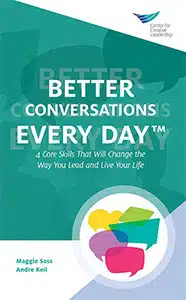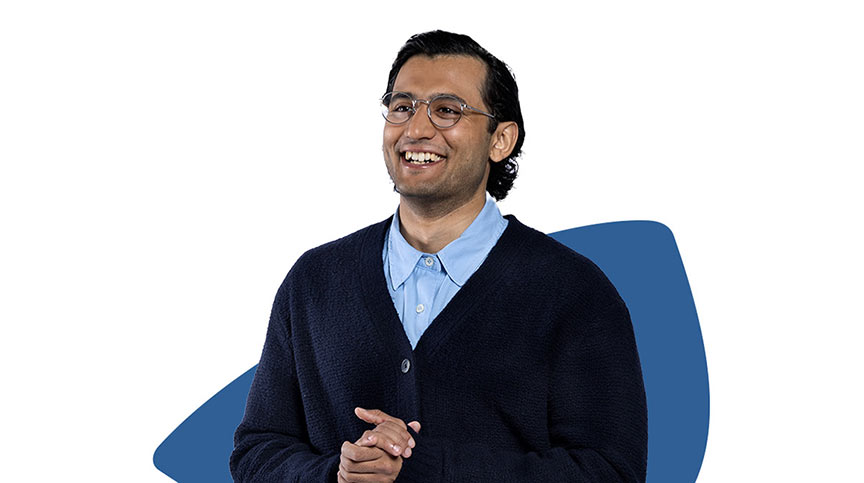Through coaching, you help others become more self-aware. You turn experiences into learning opportunities. You reinforce strengths and explore challenges. You help people take responsibility for their actions and their development.
It all starts with conversations.
What Are Coaching Conversations, and Why Are They Important?
A coaching conversation can be defined as a conversation in which someone uses coaching skills to hold a dialogue with someone else that helps them to learn, grow, and develop. This exchange can happen in a formal or informal setting, and can range from a one-time conversation to an ongoing series of discussions.
Coaching conversations are important because when done well, they can be transformational — both at an individual and organizational level. In terms of interpersonal impact, a coaching conversation between 2 people can:
- Facilitate learning, growth, and development by encouraging individuals to reflect, explore, and discover solutions
- Strengthen relationships by providing support and guidance while fostering trust, openness, and mutual respect
- Help identify and overcome barriers to performance, leading to improved outcomes
- Foster creative thinking and problem-solving, leading to innovative solutions
- Encourage accountability and promote a sense of ownership and responsibility
And when enough people are having them, coaching conversations can begin to impact entire organizations. As a critical mass is reached, with people at all levels holding candid conversations and coaching one another, something powerful begins to happen: it instills a coaching culture. Team relationships strengthen, employee engagement increases, and business performance improves, which can increase:
- Employee engagement;
- Job satisfaction and morale;
- Collaboration;
- Teamwork; and
- Bench strength.
When Do Coaching Conversations Happen?
Coaching conversations aren’t just for specialized or trained coaching professionals. In fact, nearly anyone can conduct a coaching conversation. Coaches can help anyone who is ready to identify problems and find solutions. And developing people — coaching others — is an important part of leadership. So, managers can coach people by holding coaching conversations with colleagues or direct reports in the course of everyday work.
In fact, some of the most powerful coaching conversation experiences can happen in informal exchanges — in hallways, cafeterias, workspaces, virtual chats, and video calls. As coaching interactions occur across the entire organization, whether in-person or virtually, communication becomes more clear, honest, and effective, and together, all these better conversations start to create a better culture at the organization.

Ready to get started with coaching conversations right now? Learn how to communicate better, connect more deeply, listen more effectively, build trust, and feel more satisfied — both inside and outside of work — with our Better Conversations Every Day™ guidebook.
Best Practices for Coaching Conversations
If you’re ready to try to hold a coaching conversation with someone, here are some things to know.
First, Recognize Opportunities for a Coaching Conversation
First, identify when there’s an opportunity for a coaching conversation. Not all conversations lend themselves well to coaching. Make sure you know whether it’s the right time. To recognize when someone is open to having a coaching conversation, pay attention to their cues. Listen for phrases like:
- “Can you help me think things through?”
- “I’d like to bounce some ideas off of you.”
- “Could you give me a reality check?”
- “I need some help.”
In these moments, you can turn a typical conversation into an opportunity for a coaching conversation.
Remember These 3 Keys
At that point, remember these 3 guidelines to hold a coaching conversation:
- Listen carefully.
- Respond thoughtfully.
- Resist imposing your own solution.
1. Listen carefully.
Don’t assume what the conversation is about or what path it should take. Truly listen, allowing space for others to think, reflect, and express themselves. Start with your active listening skillset, but know that truly listening goes beyond active listening, to listening to understand.
Listening to understand focuses on the idea that there are multiple levels of information we must tune into during conversations. One level, of course, is the factual information being presented — most of us tend to pay attention primarily to that. But listening for the values behind the topic at hand and the emotions that people bring to an issue is an important part of a better conversation.
That’s where we often find unstated objections, sensible reservations, and concealed barriers that might torpedo new initiatives. Stronger and more robust solutions to business challenges emerge when people are really listening to understand one another.
2. Respond thoughtfully.
Coaching isn’t about the quick fix or first solution. It’s about uncovering answers through inquiry, openness, and exploration. Start by asking powerful questions that draw out more information or stretch the other person’s thinking, such as:
- What else could you do?
- What else occurs to you?
- Who else have you talked to about this?
- Who else is affected in this situation?
Beyond creating mutual understanding about facts, when leaders ask good questions, it can help to uncover insights that wouldn’t have come to light otherwise.
A non-directive prompting question like “How do you want your team to feel when you announce the new initiative?” is likely to spark more reflection and lead to greater insights than asking “When are you announcing the new initiative?” While the latter question might be helpful in getting the person inquiring up to speed, it isn’t particularly powerful and isn’t likely to add any real value for the person answering, as they simply repeat a straightforward fact they already know.
Be sure you set a comfortable tone, maintain eye contact, and give plenty of time for them to think and respond to your questions. Encourage them to express themselves — without you agreeing or disagreeing.
3. Resist imposing your own solution.
Shift away from the common and natural tendency to want to problem-solve or give advice. There are times to direct or give answers, but coaching conversations are about the other person’s learning — not about your opinion or expertise.
Informed by neuroscience, the real art of conversation is balancing an appropriate mix of challenge and support. Providing support includes assuring people that they’ve been heard and, especially, that their feelings and values are understood. It provides an important sense of creating psychological safety at work, building trust, and encouraging greater honesty and transparency.
When that ratio is right — and practiced in an authentic rather than formulaic way — the challenge is received and actually fosters more constructive dialogue, rather than triggering defensiveness.
When you’re able to listen carefully, respond thoughtfully, and resist imposing your own solution, you have the basis of a coaching conversation.
So whether that conversation was a planned coaching session or an impromptu moment, you’ve opened the door to new thinking, new action, and valuable learning.
Ready to Take the Next Step?
Individual participants in our coaching skills program for leaders learn how to hold a coaching conversation. Or, your organization can partner with us for enterprise-wide conversational skills training with our Better Conversations Every Day™ suite and scale a culture of coaching conversations across your entire organization.












